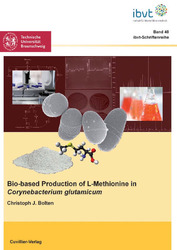| Areas | |
|---|---|
| Serie de libros (97) |
1381
|
| Nachhaltigkeit |
3
|
| Gesundheitswesen |
1
|
| Letra |
2369
|
| Ciencias Naturales |
5408
|
| Matemática | 229 |
| Informática | 319 |
| Física | 980 |
| Química | 1364 |
| Geociencias | 131 |
| Medicina humana | 243 |
| Estomatología | 10 |
| Veterinaria | 108 |
| Farmacia | 147 |
| Biología | 835 |
| Bioquímica, biología molecular, tecnología genética | 121 |
| Biofísica | 25 |
| Nutrición | 45 |
| Agricultura | 1005 |
| Silvicultura | 201 |
| Horticultura | 20 |
| Ecología y conservación de la tierra | 148 |
| Ciencias Ingeniería |
1795
|
| General |
98
|
|
Leitlinien Unfallchirurgie
5. Auflage bestellen |
|
Erweiterte Suche
Bio-based Production of L-Methionine in Corynebacterium glutamicum (Volumen 48) (Tienda española)
Christoph J. Bolten (Autor)Previo
Indice, Datei (62 KB)
Lectura de prueba, Datei (210 KB)
In the present work, Corynebacterium glutamicum pathways of the central metabolism were investigated from a systems-oriented view regarding a detailed understanding of the underlying reaction network towards future biotechnological production of L-methionine. The physiological characterization of the anabolic network of mutants, specifically designed for these studies, was achieved by combining fluxomics and metabolomics after rigorous validation of existing technologies, especially for metabolite analysis, and development of novel efficient protocols adapted to C. glutamicum. Above all, a lack of suitable sampling methods in the field of metabolomics was identified by validation of common protocols, not only for C. glutamicum, but also for various microorganisms including biotechnological important bacteria and yeasts. Based on these findings, a novel differential approach was developed and validated, whereby intracellular levels are determined via differential analysis of total broth and culture filtrate without cells. Applying this method, the existence of a novel threonine-independent pathway for isoleucine biosynthesis starting from homolanthionine was identified in C. glutamicum ΔmcbR. This pathway withdraws significant amounts of carbon from the methionine biosynthesis. Subsequent studies identified the availability of NADPH as additional limiting step. In C. glutamicum ΔmcbR, a deletion mutant with a deregulated methionine and cysteine pathway, the ADPH/NADP+ ratio was only 0.29 and thus much lower as that of the wild-type (2.35). Engineering of the NADPH metabolism via increased pentose phosphate pathway activity by enhancement of the transketolase operon resulted in a significantly increased NADPH/NADP+ ratio (1.40). Moreover, the utilization of the reduced sulfur sources methanethiol and dimethyldisulfide was investigated. Both sulfur compounds are utilized by C. glutamicum as source of sulfide and C1 carbon. This opens new possibilities to pass the high energy and NADPH demanding pathways of sulfate reduction and C1 metabolism for methionine biosynthesis. Using an isotope labeling study, the conversion of methionine to S-adenosylmethionine was found to be highly active. Thus, this reaction competes with the export of methionine and displays a target to be downregulated in a future production strain.
| ISBN-10 (Impresion) | 386955486X |
| ISBN-13 (Impresion) | 9783869554860 |
| ISBN-13 (E-Book) | 9783736934863 |
| Idioma | Inglés |
| Numero de paginas | 144 |
| Edicion | 1 Aufl. |
| Serie | Schriftenreihe des Institutes für Bioverfahrenstechnik der Technischen Universität Braunschweig |
| Volumen | 48 |
| Lugar de publicacion | Göttingen |
| Lugar de la disertacion | TU Braunschweig |
| Fecha de publicacion | 21.09.2010 |
| Clasificacion simple | Tesis doctoral |
| Area |
Biología
Bioquímica, biología molecular, tecnología genética |








